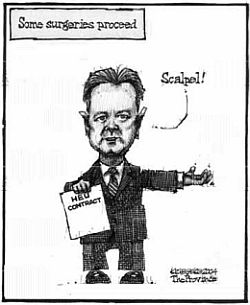 B.C.’s Health Minister, Colin Hansen, performs major surgery on HEU contract |
A reader wrote into VanRamblings recently singing the praises of the IWA. In his commentary, this VanRamblings reader suggested that a resolution to the HEU-government impasse was readily apparent: adopt the non-confrontational IWA employer relations model.
Further, said (misguided, naïve or, perhaps, just meanspirited) reader went on to say that the union movement in British Columbia, as a whole, would do well to consider adoption of the IWA model as the right and proper model for future employee-employer contract “negotiations”.
In today’s Vancouver Sun, Victoria-based, and generally conservative-oriented freelance writer Paul Willcocks (and regular Vancouver Sun contributing writer on Saturdays) while suggesting …
“health sector wages and benefits in B.C. were badly managed by the (previous New Democratic government), and do need to be reduced. But most British Columbians believe that (negotiation of a new HEU contract) must be done with compassion and respect for people’s basic rights.”
also takes IWA boss, and putative federal Liberal candidate in New Westminster-Coquitlam Dave Haggard, to task for his “critical role in helping the government contract out thousands of health sector jobs at much lower wages and benefits, setting the stage for this week’s events.”
And that’s not all, writes Willcocks. As The Vancouver Sun online is available only by subscription, VanRamblings has made Paul Willcocks’ column available here, or by clicking on the link below.
Haggard’s helping hand for Liberals’ plans
Paul Willcocks
Vancouver Sun
May 1, 2004
VICTORIA – It’s fitting that IWA head Dave Haggard stepped up to play left wing on Paul Martin’s B.C. dream team just as the provincial Liberals took a legislative club to 43,000 health sector workers.
Because without Mr. Haggard and the IWA, this crisis might not have happened. The IWA played a critical role in helping the government contract out thousands of health sector jobs at much lower wages and benefits, setting the stage for this week’s events.
Privatizing health services has been a key part of the Liberals’ cost-cutting plans. The private contractors hire new staff and provide much lower wages and benefits. Contracting out laundry services or food preparation meant wages for a worker went from $34,000 to $21,000, and some of those savings flow back to government.
The Liberals were able to set the stage for privatization on their own. They used legislation to rip up the union contracts, eliminating job protection and limits on contracting out. They took away labour code successorship protection for the employees. The companies and health authorities were ready to go.
Almost. The private companies knew that they could hire people at a lower rate. But there was still the risk that those newly hired employees might soon decide to form a union — perhaps even join the HEU — and seek higher wages.
Enter Mr. Haggard and his union. The IWA sat down with the three main companies bidding for the privatized work and — before employees were hired — agreed to contracts that provided low wages and few benefits. Job applicants were told to sign an IWA membership card as part of the interview process. Problem solved; risk removed.
The companies would likely have filled the jobs on the same terms without the IWA’s complicity. But workers would then have had the right to decide whether they wanted to bargain collectively, and who should represent them. Instead, they’re locked in to an agreement they never approved, paying dues to a union they never chose.
The result is that the IWA gets badly needed revenue, the employers get a favourable contract and a co-operative union — and employees lose the basic right to decide if they want a union and vote for or against a contract that defines their terms of employment.
And the government gets to see privatization move ahead much more quickly, and at lower cost. Companies can bid for the work more confidently — and more cheaply — if they know they won’t be troubled by employees who decide to unionize and press for higher wages.
Employees unhappy with the IWA’s representation could decertify. But the process is slow and difficult, and for these workers, dangerous.
The Liberals passed legislation last year to remove their successorship protection.
Other workers are guaranteed that if a business is taken over by a new owner, the contract continues to apply. But if these companies find themselves facing a difficult union, they can abandon the operation. A new contractor can then take over, free to hire new staff and sign a more accommodating contract with a union like the IWA. (This has already happened.)
It makes Mr. Haggard an odd choice for Mr. Martin’s B.C. dream team, set up as the candidate for New Westminster-Coquitlam without the bother of a nomination contest. And it makes you wonder — again — how much Mr. Martin really knows or understands B.C.
Conservative candidate Paul Forseth won the seat in 2000, finishing about 6,000 votes ahead of the Liberal. To beat him, Mr. Haggard will have to win over most of the 7,000 people who voted NDP last time. Given the IWA’s role in chopping the wages of health care workers, that’s unlikely.
Health sector wages and benefits in B.C. were badly managed by the NDP, and do need to be reduced.
But most British Columbians believe that must be done with compassion and respect for people’s basic rights.
It hasn’t been. And Mr. Haggard’s role in the process likely means his federal political career will be measured in months.
E-mail: Paul Willcocks
© The Vancouver Sun 2004
That should shut him up!
David,
I fear not, for ideologues are generally wedded to their wrong-headed positions.